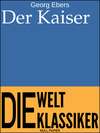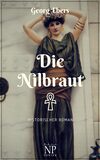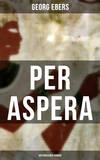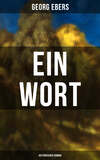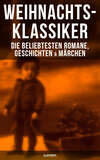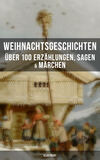Kitabı oku: «Margery (Gred): A Tale Of Old Nuremberg. Complete», sayfa 17
CHAPTER III
I had forgotten my fears and gloomy forebodings by the time I climbed into bed in my darkened chamber. Sleep forthwith closed my eyes, and I lay without even a dream till Cousin Maud waked me. I turned over by reason that I was still heavy with slumber; yet she stood by my bed, and scarce half a quarter of an hour after, lo, again I felt her hand on my shoulder and woke up quaking, with a cold sweat on my brow. I had dreamed that I was riding out in the Lorenzer-wald with Hans and my grand-uncle and other some; but we went slowly and softly, by reason that all our horses fell lame. And it fell that on the very spot where Ann had flown into Herdegen’s arms I beheld a high, yellow grave-stone, and on it was written in great black letters: “HANS HALLER.”
Hereupon I had started up with a loud cry, and it was long or ever my brain was clear as to the world about me. Cousin Maud laughed to see me so drunk asleep, as was not my wont; yet could she not deny that my dream boded no good. Nevertheless, quoth she, it was small marvel that such a heathen Turkish turmoil as we had been living in should beget monstrous fancies in a young maid’s brain. She would of set purpose have left me to sleep the day through, to give me strength; howbeit Herdegen had twice come to ask for me, and so likewise had Ann and Hans, and it wanted but an hour and a half of noon. This made me laugh; nevertheless I minded me then and there of all that had befallen last night at Pernhart’s house-door and in the school of arms, and, moreover, that we were bidden this day to eat with the Tetzels; also that they, and eke my grand-uncle, were still in the belief that Herdegen’s betrothal to Ursula might be at once proclaimed to their friends.
I began to dress in haste and fear, and Susan was in the act of plaiting my hair when Cousin Maud flew in to say that Queen Barbara had sent her own litter to carry me to her. Thus had I to make all speed.
The royal quarters in the castle had been newly ordered by the town at his Majesty’s desire, and they were indeed bravely decked; yet never had the like show pleased me less. The Queen was giving audience to the Pope’s Legate, to their excellencies the envoys from the Greek Emperor, to my Lord Conrad the Elector of Maintz, and many more nobles. She had made so bold as to declare that the German maidens were no less skilled in the art of song than the damsels of Italy, and had bidden me to her in such hot haste that I might let the notables there assembled hear a few lays. I might not say nay to the royal behest; for better, for worse, I must fain take my lute and sing, at first alone, and then with my lord Conte di Puppi. Our voices presently brought the King to the chamber, and in truth I won praise enough if I had best cared to hear it. Nay, for the first time it was a torment to me to sing, and when the notables had all been sent forth, and I was alone with the Queen and her ladies, I knew not what ailed me but I burst into tears, hot and bitter tears. The gracious Queen took me in her arms with womanly sweetness, but while she gave me her phial of vinegar to smell, and spoke words of comfort, I was suddenly scared at hearing close behind me right woeful sobbing and sighing, as from a woman’s breast. I looked about me, and beheld Porro, the jester, who had cast himself on a couch and was mocking me, pulling such a grimace the while that his smooth, long, thin face seemed grown to the length of two lean faces. The sight was so merry that I was fain to laugh. Whereas he nevertheless ceased not from sobbing, the Queen reproved him and bid him not carry his fooling too far. Whereupon he sobbed out: “Nay, royal and gracious Coz, thou art in error. Never have I so shamelessly forgotten to play my part as Fool, as at this moment. Alack, alack! what a thing is life! Were we not one and all born fools, and if we did but measure it as it is now and ever shall be, with the wisdom of the sage, we should never cease to bewail ourselves, from the nurse’s rod to the scythe of death.”
Whether Porro were in earnest I could not divine; his face, like a mystic oracle, might bear manifold interpretations; verily his speech went to my heart. And albeit hitherto life had brought me an hundredfold more reasons for thanksgiving than sorrow, meseemed that it had many griefs in store. The Queen indeed replied full solemnly: “Peradventure it is true. Yet forget not that it is not as Sage that you attend us.—Moreover I, as a good Hungarian, know my Latin, and the great Horatius Flaccus puts your dismal lore to shame; albeit, as a Christian woman, I am fain to confess that it is wiser and more praiseworthy to bewail our own sins and the sins of the world, and to meditate on the life to come, than to live only for present joys. As for thee, sweet maid, for a long time yet thou may’st take pleasure in the flowers, even though venom may be hidden in their cups.”
“Men are not wont to eat them,” replied the fool. “And I have often marvelled wherefor the flighty butterfly wears such gay and painted wings, while every creature that creeps and grubs is grey or brown and foul to behold.”
Whereupon he burst into loud laughter and such boisterous mirth that we fairly wept for merriment, and my lady Queen bid him hold his peace.
On my departing I had need to pass through the King’s audience-chamber. He was bidding my Hans depart right graciously, and I went forth into the castle yard with Masters Tucher, Stromer, and Schurstab, all members of the Council. I fancy I hear them now thanking Hans for his fearless manfulness in saying to his Majesty that the treasure-chest must ever be empty if the old disorder were suffered to prevail. Likewise they approved the well-devised plan which he had proposed for the bettering of such matters, and my heart beat high with pride as I perceived the great esteem in which the worshipful elders of our town held their younger fellow.
Hans might not part company from them; but when I got into the litter he whispered to me: “Be not afraid—as to Herdegen and the Junker—you know. Farewell till we meet at the Tetzels’.”
When I came home I learnt that my brother, and Ann, and then Eppelein had come to ask for me; now must I change my attire for the feast, and my heart beat heavy in my bosom. The bold Brandenburger and my brother were perchance at this very hour crossing swords.
Cousin Maud, who now knew all, and I stepped out of our litters at the Tetzels’ door. Eppelein was standing by the great gate, booted and spurred, holding two horses by their bridles. My lord who spoke with him was my dear Hans. We went into the hall together, and as our eyes met, I wist that there was evil in the air. The letter he held bid him ride forthwith to Altenperg. Junker Henning and my brother were minded to have a passage of arms, and with sharp weapons. This, however, they might not do within the limits of the city save at great risk, inasmuch as that the town was within the King’s peace, and by a severe enactment knight or squire, lord or servant, in short each and every man was threatened by the Emperor with outlawry, who should make bold to provoke another to challenge him, or to lift a weapon against another with evil intent, be he who he might, throughout the demesne of Nuremberg or so long as the diet was sitting. Hence they would go forth to Altenperg, inasmuch as it was the nearest to arrive at of any township without the limits of the city.
All this my lover had heard betimes that morning; but Herdegen had told him that Master Schlebitzer and a certain Austrian Knight would attend him. Now the letter was to say that they had both played him false; the former in obedience to the stern behest of his father, the town-councillor; the second by reason that his Duke commanded his attendance. And Herdegen hereby urgently besought my Hans that he would take the place thus left unfilled and ride forthwith to Altenperg.
Nor was this all the letter. In it my brother set forth that he had pledged his word solemnly and beyond recall to Ann and her parents, and entreated my lover to declare to the Tetzels and to his grand-uncle that henceforth and forever he renounced Ursula. He would speak of the matter at greater length at the place of meeting.
Cousin Maud and Hans and I held a brief council, and we were of one mind: that this message should not be given to the Tetzels till after the great dinner and when we should know the issue of the combat. My heart urged me indeed to desire my lover to forego this ride, and I mind me yet how I implored him with uplifted hands and how he forced himself to put them from him with steadfast gentleness. And when he told me that he for certain, if any one, could pacify the combatants or ever blood should be shed, I gazed into his brave and manful and kind face, and methought whither he went all must be for the best, and I cried with fresh assurance: “Then go!” Every word do I remember as though it were graven in brass.
Eppelein cracked his whip against his leathern boot-tops; old Tetzel’s leaden voice cried out to enquire where we were lingering, and a silken train came rustling down the stairs. My lover kissed his hand to me, and I went forth with him into the court-yard. His fiery horse gave him so much to do that he never marked my farewell. On a sudden it flashed through my brain that this was that very horse which my grand-uncle had given to Herdegen, and herein again, meseemed, was an omen of ill. Likewise I noted that Hans was in silken hose with neither spurs nor riding-boots. Howbeit the Hallers had many horses; and as a lad he had been wont to ride with or without a saddle, and was a rider whom none could unhorse, even in the jousting-ring.
He had soon quelled his steed and was trotting lightly over the stones, followed by Eppelein; but as he vanished round the first corner meseemed that the bourn stone, as he rode past it, was turned into the yellow gravestone I had seen in my dream, and that again I saw the great black letters of the name “Hans Haller.”
I passed my hands across my eyes to chase away the hideous vision, and I was young enough and brave enough to return Ursula’s greeting without any quaking of my knees. Cousin Maud, meanwhile, had walked up the stairs, snorting and fuming like a boiling kettle; nor could she be at peace, even among the company who were awaiting the bidding to table. Many an one marked that something more than common was amiss with her. I refrained myself well enough, and I excused my brother’s and my lover’s absence with a plea of weighty affairs. My grand-uncle, however, guessed the truth, and when I gave true answer to his short, murmured questions he wrathfully cried: then these were the thanks he got? Henceforth he would plainly show how he, who had been a benefactor, could deal with the youth who had dared to mock his authority. Hereupon I besought him first to grant me a hearing for a few words; but he waved me away in ire, and signed to Ursula, who hung on his arm, and she set her lips tight when he presently with wrathful eyes whispered somewhat in her ear whereof I believed I could guess the intent. And when I beheld her call Sir Franz von Welemisl to her side and give him her hand, speaking a few words in a low voice, I discerned that, in truth she knew all.
She presently led her father aside and told him somewhat which brought the blood to his ashy face, and led him to say her nay right vehemently. But, as she was wont, she made good her own will and he shrugged his shoulders, wrathful indeed, but overmastered by her.
During this space the great door of the refectory had been thrown open, and when Tetzel with his old mother moved that way, desiring the guests to follow him, my Uncle Christian, Ann’s faithful friend, whispered to me that Herdegen had told him that he was now pledged to his “dear little warder,” and likewise what was on hand between him and the Junker von Beust. I might be easy, quoth he; the Brandenburger would have a bitter taste of Nuremberg steel, of that he was fully assured. And he ended his speech with a merry: “Hold up your head, Margery.”
Then we all sat down at the laden table, Dame Clara sitting at the top, albeit she looked but sullen and ill to please.
Ursula had chosen to set Sir Franz by her side. Herdegen’s seat, at her left hand, was vacant; and she bid her white Brabant hound, as though in jest, to leap into it. The meal was served, but it all went in such gloomy silence that Master Muffel, of the town-council, whom they named Master Gall-Muffel, whispered across the table to my Uncle Christian “was it not strange to give a funeral feast without ever a corpse.” Again I shuddered. My jovial uncle had already lifted his glass, and stretching himself at his ease he nodded to me, and drank, saying loud enough for all to hear: “To the last pledged couple, and the faithfullest pair of lovers.”
I nodded back to him, for I wist what he meant, and drank with all my heart. Ursula had meanwhile kept her ears and eyes intent on us, and she now signed to her father and he slowly rose, clinked on his glass, and seeing that many were hearkening for what he should say, he declared to his guests that he had bidden them to this banquet not alone to do honor to the name-day of his venerable mother, whose praises his friend Master Tucher had eloquently spoken, but rather that he might announce to them the betrothal of his daughter Ursula to the noble knight and baron Franz von Welemisl. Then was there shouting and clinking and emptying of wine cups, whereat old Dame Clara Tetzel, who was deaf and had failed to gather the purport of her son’s address, cried aloud “Is young Schopper come at last then?”
Hereupon Sir Franz turned pale; he had gone up to the old woman, glass in hand, with Ursula, and she now spoke into her grand-dame’s ear to explain the matter. The old woman looked first at her son and then at my grand-uncle, and shook her head; nevertheless she put a good face on a bad case, gave Sir Franz her hand to kiss, and was duly embraced by Ursula; yet she sat nodding her head up and down, and ever more shrewdly as she heard the bridegroom cough. Amazement sat indeed on the faces of all the guests; howbeit the ice was broken, and the silent and gloomy company had on a sudden turned right mirthful. Cousin Maud, meseemed, was the most content of all. Ursula’s betrothal had rescued her favorite from great peril, and henceforth her plumed head-gear was at rest once more.
All about me was talk and laughter, glasses ringing, voices uplifted in set speeches, and many a shout of gratulation. When a betrothal is in the wind, folks ever believe that they have hold of the guiding clue to happiness, even if it be between a simpleton and a deaf mute.
The seat on my left hand, which my lover should have filled, remained empty; on my right sat his reverence Master Sebald Schurstab, the minorite preacher and prior who, so soon as he had spoken in honor of one toast, fixed his eyes on the board and thought only of the next. Thus, in the midst of all this mirthful fellowship, there was nought to hinder my fears and hopes from taking their way. Each time that a cry of “Hoch!” was raised, I roused me and joined in; scarce knowing, however, in whose honor. Likewise the hall waxed hotter and hotter, and the air right heavy to breathe.
To-day again, as yesterday, a storm burst over us. Albeit the sun was not yet set, it was presently so dark that lights had been brought in and fifty tapers in the silver candlesticks added to the heat. The lightning flashes glared in at the curtained windows like a flitting lamp, and the roar of the thunder shook the panes which rattled and clanked in their leaden frames. The reverend Prior called on the blessed saints whose special protection this house had never neglected to secure, and crossed himself. We all did the same, and had soon forgotten the storm without. The glasses ere long were clinking once more. I watched the numberless dishes borne in and out-roasted peacocks, with showy spread tails and crested heads raised as it were in defiance: boars’ heads with a lemon in their mouth and gaily wreathed; huge salmon lying in the midst of blue trout, with scarlet crawfish clinging to them; pasties and skilfully-devised sweetmeats; nay, now and again, I scarce consciously put forth my hand and carried this or that morsel to my mouth but whether it were bread or ginger my tongue heeded not the savor. Silver tankards and Venetian glasses were filled from flasks and jugs; I heard the guests praising the wines of Furstenberg and Bacharach, of Malvoisie and Cyprus, and I marked the effects of the noble and potent grape-juice, nay, now and then I played the part of “warder” to Uncle Christian; yet meseemed that it was only by another’s will or ancient habit that I raised a warning finger. Was I in truth at a banquet or was I only dreaming that I sat as a guest at the richly spread board? The only certain matter was that the storm was overpast, and that no hail nor rain now beat upon the window panes. How wet must my Hans be, who had ridden forth in court array, without a cloke to cover him.
To judge by the voices and demeanor of the menfolk the end of the endless meal must surely be not far off, and indeed dishes were by this time being served with packets of spices and fruits and pies and sweetmeats for the little ones at home. I drew a deeper breath, and methought the company would soon rise from the table, forasmuch as that Jost Tetzel had already quitted his seat. Then I beheld his pale face through a curtain and his lean hand beckoning to my grand-uncle. He likewise rose, and Ursula followed him. Forthwith, from without came a strange noise of footsteps to and fro and many voices. A serving man came to hail forth Master Ebner and Uncle Tucher, and the muttering and stir without waxed louder and louder. The guests sat in silence, gazing and enquiring of each other. Somewhat strange, and for certain somewhat evil, had befallen.
My heart beat in my temples like the clapper of an alarm-bell. That which was going forward, and to which one after another was called forth, was my concern; it must be, and mine alone. I felt I could not longer keep my place, and I had pushed back my seat when I saw Uncle Tucher standing by Cousin Maud, and his kind and worthy face, still ruddy from the wine he had drunk, was a very harbinger of horror and woe. He bent over my cousin to speak in her ear.
My eyes were fixed on his lips, and lo! she, my second mother, started up hastily as any young thing and, clasping her hand to her breast she well-nigh screamed: “Jesu-Maria! And Margery!”
All grew dark before my eyes. A purple mist shrouded the table, the company, and all I beheld. I shut my eyes, and when presently I opened them once more, close before me, as it were within reach, behold the yellow headstone with black letters thereon, as in my dream; and albeit I closed my eyes again the name “Hans Haller” was yet there and the letters faded not, nay, but waxed greater and came nigher, and meseemed were as a row of gaping werewolves.
I held fast by the tall back of my heavy chair to save me from falling, on my knees; but a firm hand thrust it aside, and I was clasped in a pair of old yet strong arms to a faithful heart, and when I heard Cousin Maud’s voice in mine ear, though half-choked with tears, crying: “My poor, poor, dear good Margery!” meseemed that somewhat melted in my heart and gushed up to my eyes; and albeit none had told me, yet knew I of a certainty that I was a widow or ever I was a wife, and that Cousin Maud’s tears and my own were shed, not for Herdegen, but for him, for him....
And behold, face to face with me, who was this? Ursula stood before me, her blue eyes drowned in tears—tears for me, telling me that my woe was deep enough and bitter enough to grieve even the ruthless heart of my enemy.
CHAPTER IV
The storm had cleared the air once more. How fair smiled the blue sky, how bright shone the sun, day after day and from morning till night; but meseemed its splendor did but mock me, and many a time I deemed that my heart’s sorrow would be easier to bear with patience if it might but rain, and rain and rain for ever. Yea, and a grey gloomy day would have brought rest to eyes weary with weeping. And in my sick heart all was dark indeed, albeit I had not been slow to learn how this terror had come about.
That was all the tidings I had craved; as to how life should fare henceforth I cared no more, but let what might befall without a wish or a will. Sorrow was to me the end and intent of life. I spurned not my grief, but rather cherished and fed it, as it were a precious child, and nought pleased me so well as to cling to that alone.
Howbeit I seldom had the good hap to be left to humor this craving. I was wroth with the hard and bitter world for its cruelty; yet it was in truth that very world, and its pitiless call to duty, which at that time rescued me from worse things. Verily I now bless each one who then strove to rouse me from my selfish and gloomy sorrow, from the tailor who cut my mourning weed to Ann, whose loving comfort even was less dear to me than the solitude in which I might give myself up to bitter grieving. All I cared for was to hear those who could tell of his last hours and departing from this life, till at last meseemed I myself had witnessed his end.
From all the tidings I could learn, I gathered that old Henneleinlein, whose gall had been raised against me by the Court Fool, had no sooner parted from us at Master Pernhart’s door than she had hastened to the school of arms to make known to Ursula that my brother had plighted his troth anew to his cast-off sweetheart. Hereupon Ursula had dared to say to the Junker that Herdegen was her knight, who would pick up his glove which he had cast down at the former dance; but that he nevertheless was playing a two-fold game, and had treacherously promised Ann to wed her, to win her favor likewise. Hereupon the Brandenburger had been filled with honest ire, had sworn to Ursula that he would chastise her false lover, and was ready, not alone to accept my brother’s defiance, but to fight with ruthless fury.
Thus Ursula’s plot had prospered right well, inasmuch as, so long as she hoped to win Herdegen, she had been in deathly fear lest the Junker should fall out with him; whereas, now that in her wrath she only desired that the faithless wight should give an account to the Junker’s sword, she thought fit in her deep and malignant fury to brand my brother as the challenger, knowing that if the combat had a bloody issue he would of a surety suffer heavy penalty. And in truth she had not reckoned wrongly when she declared that my brother, whom she knew only too well, would be her ready, champion.
On the morning next after the great dance she had addressed a brief letter to Herdegen beseeching him, for the friendship’s sake which had bound them from their youth up, and by reason that she had no brother, to teach Junker von Beust that a patrician’s daughter of Nuremberg should not lack a true knight, when Brandenburg pride dared to cast scorn on her in the face of all the world. My brother’s response to this letter was a challenge to the Junker; yet had he not perchance been in such hot haste, save that he had long burned to punish the overweening young noble who had given him many an uneasy hour. He scarce, indeed, would have drawn his sword at Ursula’s behest, inasmuch as he could plainly see that what she had most at heart was to make their breach wear such seeming to other folks as though he, who had been looked upon by the whole city as her pledged husband, had not quitted her, but had been ready rather to shed his heart’s blood in her service.
Verily Ursula believed that she had found a sure instrument of vengeance, whereas she had heard say that Junker Henning von Beust was one of the most dreaded swordsmen in the Marches. Herdegen, to be sure, was likewise famed in Nuremberg as a doughty champion; yet it is ever the way in Franconia, nay, and in all Germany, to esteem outlandish means more highly than the best at home. Moreover she had many a time heard my grand-uncle declare that the gentlemen of our patrician families were not above half knights, and her intent was to sacrifice Herdegen to the Brandenburger’s weapon.
Howbeit she had reckoned ill. Hans, who did service to my brother as his second at Altenperg, after striving faithfully to make peace between the two, was witness how our Nuremberg swordsman, who had had the finest schooling at Erfurt, Padua, and Paris, not merely withstood the Brandenburger, but so far outdid him in strength and swiftness that the Junker fell into the arms of his friends with wounds in the head and breast, while Herdegen came forth from the fray with no more hurt than a slight scratch on the arm.
The witnesses saw what he could do with amazement, and Sir Apitz von Rochow avowed that at my brother’s first thrust he foresaw his cousin’s evil plight; and they said that during the combat the supple blade of the Nuremberger’s bedizened sword was changed into a raging serpent, which wound in everywhere, and bit through iron and steel. Afterwards he set forth that perchance Junker Schopper, who was said to be even better versed in all manner of writing than in the use of his weapon, had made use of some magic art, whereat a pious Knight of the Marches would fain cross himself.
Now whereas Junker von Beust had been in attendance on the King’s person, the end of the fray could not be hidden from his Majesty, and so soon as the wounded man had been carried into the priest’s house at Altenperg for shelter and care, it was needful to remove his fortunate foe into surety from King Sigismund’s wrath. In this matter both Rochow and Muschwitz, who were the Junker’s seconds, demeaned them as true nobles, inasmuch as they offered my brother refuge and concealment in their castles, albeit they accused him between themselves of some secret art; but he who was so soon to die counselled him to bide a while with Uncle Conrad at the forest lodge, and see what he himself and other of his friends might do to win his pardon.
When, at length, my lover was about to depart, the storm had burst; wherefore the Brandenburgers besought him to tarry in the priest’s house till it should be overpast. This he would not do, by reason that his sweetheart looked for him with a fearful heart, knowing that her brother was in peril; and forthwith he rode away. Herdegen gave him Eppelein to attend him, and to bring back to him such matters as he had need of, and so my beloved set forth for the town, the serving man riding behind him.
It rained indeed and lightened and thundered, yet all was well till, nigh to Saint Linhart, the hail came down, beating on them heavily. At that moment a burning flash, with a terrible crash of thunder, reft a tree asunder by the road-way; his powerful horse was maddened with fear, stood upright, fell back, and crushed his rider against the trunk of a poplar tree. Never more did I look on the face of the true lover to whom I was so closely knit—save only in dreams; and I thank those who held me back from beholding his broken skull. To this day he rises before me, a silent vision, and I see him as he was in that hour when he gave me a parting kiss on our threshold, in the pale gleam of early morning, solemnly glad and in his festal bravery. Yet they could not hinder me from pressing my lips to the hands of the beloved body in its winding-sheet.
It was on a fair and glorious morning—the day of the Assumption of the Blessed Virgin—when Hans Haller, Knight, Doctor, and Town councillor, the eldest of his ancient race, my dear lord and plighted lover, was carried to the grave. The velvet pall wherewith his parents covered the bier of their beloved and firstborn son was so costly, that the price would easily have fed a poor household for years. How many tapers were burnt for him, how many masses said! Favor and good-will were poured forth upon me, and wherever I might go I was met with the highest respect. Even in my own home I was looked upon as one set apart and dedicated, whose presence brought grace, and who should be spared all contact with the common and lesser troubles of life. Cousin Maud, who was ever wont to mount the stair with an echoing tread and a loud voice, now went about stepping softly in her shoes, and when she called or spoke it was gently and scarce to be heard.
As for me I neither saw nor heard all this. It did not make me thankful nor even serve to comfort me.
All things were alike to me, even the Queen’s gracious admonitions. The diligent humility of great and small alike in their demeanor chilled me in truth; sometimes meseemed it was in scorn.
To my lover, if to any man, Heaven’s gates might open; yet had he perished without shrift or sacrament, and I could never bear to be absent when masses were said for his soul’s redemption. Nay, and I was fain to go to churches and chapels, inasmuch as I was secure there from the speech of man. All that life could give or ask of me, I had ceased to care for.
If, from the first, I had been required to bestir myself and bend my will, matters had not perchance have gone so hard with me. The first call on my strength worked as it were a charm. The need to act restored the power to act: and a new and bitter experience which now befell was as a draught of wine, making my heavy heart beat high and steady once more. Nought, indeed, but some great matter could have roused me from that dull half-sleep; nor was it long in coming, by reason that my brother Herdegen’s safety and life were in peril. This danger arose from the fact that, not long ere the passage of arms at Altenperg, in despite of strait enactments, the peace of the realm had many times been broken under the very eyes of his Majesty by bloody combats, and the Elector Conrad of Maintz had gone hand in hand with him of Brandenburg to entreat his Majesty to make an example of this matter. These two were likewise the most powerful of all the electors; the spiritual prince had, at the closing of the Diet, been named Vicar of the Empire, and he of Brandenburg was commander-in-chief of all the Imperial armies. And his voice was of special weight in this matter, inasmuch as the great friendship which had hitherto bound him to the Emperor had of late cooled greatly, and both before and during the sitting of the Diet, his Majesty had keenly felt what power the Brandenburger could wield, and with what grave issues to himself.


